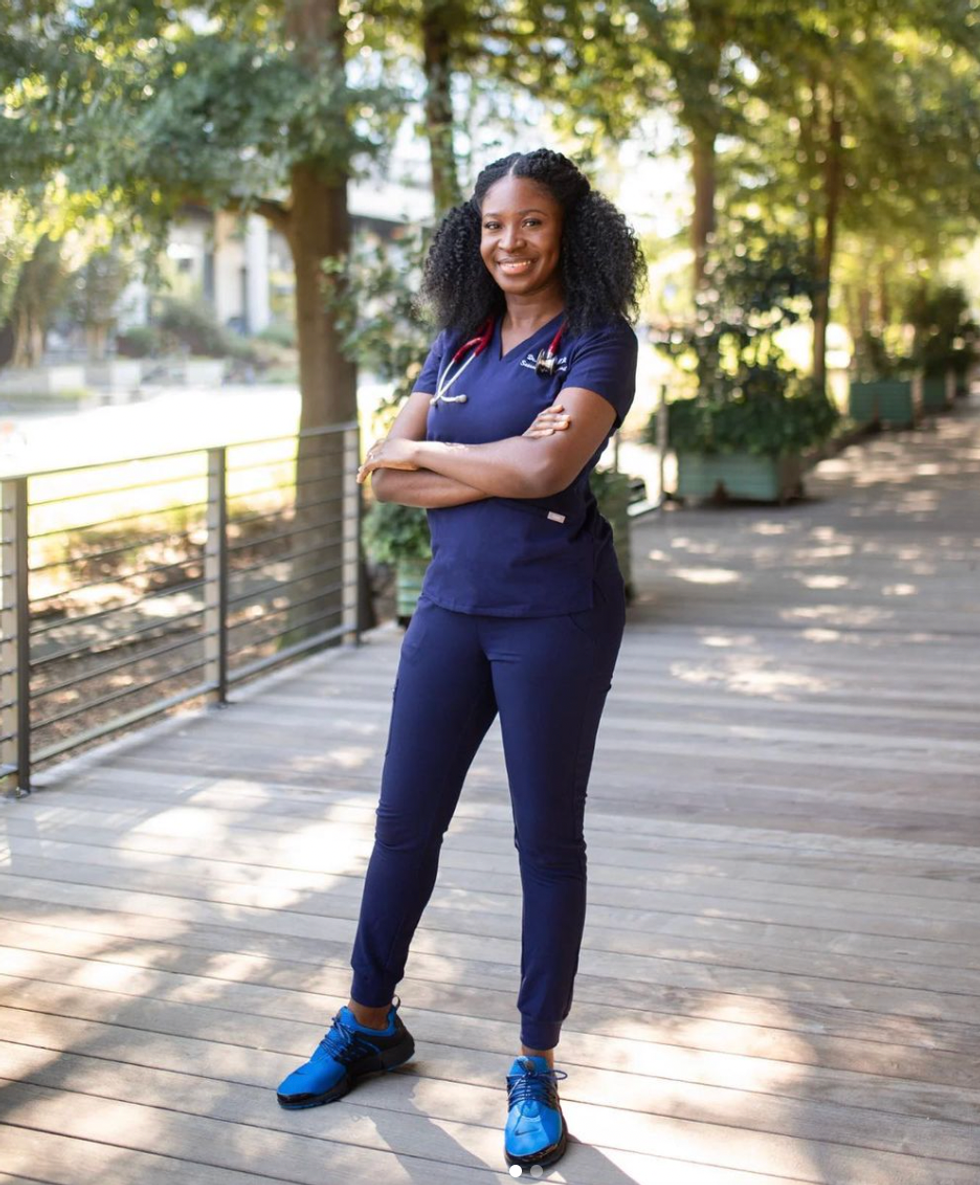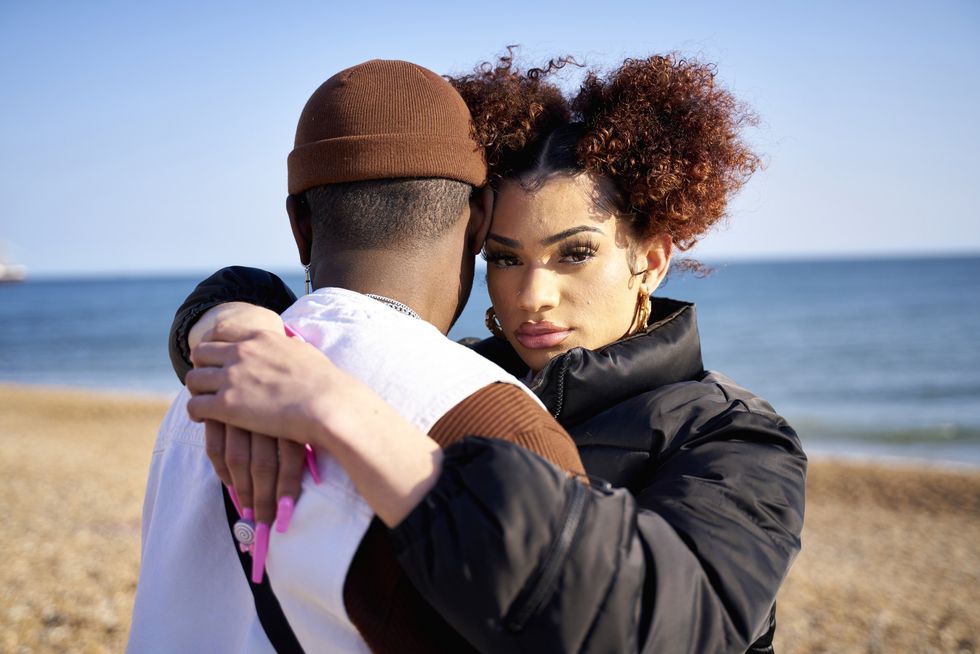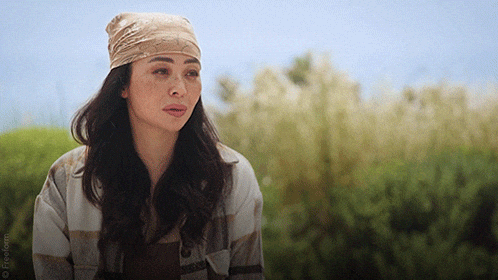Black Women Are Getting More STIs Than Any Race, Here's What You Should Know

Sex is a popular topic that we see discussed in TV shows, movies, podcasts, or just conversations with friends. What's usually highlighted is the excitement and intimacy that sex can bring, and what seems to be left out is the reality of STIs and STDs.
According to Sage Journal, more Black women are getting STIs than anyone else due to many contributing factors, "such as lack of access to healthcare and preventive measures, mistrust of the healthcare system, the stigma and lack of awareness of STIs, and gender inequality in intimate relationships."
"An article by Sage Journal examined data from 564 African American women who cited reasons such as the limited pool of eligible African American men, which led many to date men who were married, older, had sex with other men, had multiple sexual partners, and/or had been incarcerated, all of which increase the risk of STIs," Dr. Maxine Owusu tells xoNecole.
Dr. Owusu is a board-certified emergency physician, healthcare advocate, and children's book author, and in our Q&A, she dishes on the racial disparities in healthcare, safe sex, and more.

Dr. Maxine Owusu
xoNecole: You are a healthcare advocate. Why is it important for you to give back to the community and what are some ways you do that?
Dr. Maxine Owusu: I understand the significance of being an advocate for each patient, especially as one of the first doctors they encounter upon entering the hospital. I take the time to listen to my patients, educate them on their conditions, and offer resources, with the help of our social worker, to help them navigate the healthcare system and its pitfalls. I give back to the community by participating in health fairs and panels with my local church, Manifest Church, in Jonesboro, GA.
Additionally, I engage with students interested in medicine through mentorship and talks that highlight the need for diversity in healthcare. I also educate children about anatomy using my STEM KIDDOS sensory anatomy toys and children's book as a tool to capture their interest and pursue medicine. My impact extends globally through my involvement in medical missions in Ghana and the Dominican Republic.
xoN: You are also passionate about Black women's health and speak out about STDs. What do people get wrong about STDs?
Dr. Owusu: Most people think you can only get an STI (sexually transmitted infection) when you're symptomatic or only through vaginal intercourse. In many cases, both men/women (especially men) might not have symptoms or have mild symptoms, thus delaying evaluation appropriate/treatment while increasing the risk of transmission. You can also get an STI with just one through oral & anal sex. Many people also don't know that repeated STIs can lead to infertility in women.
Most people think you can only get an STI (sexually transmitted infection) when you're symptomatic or only through vaginal intercourse. In many cases, both men/women (especially men) might not have symptoms or have mild symptoms, thus delaying evaluation appropriate/treatment while increasing the risk of transmission. You can also get an STI with just one through oral & anal sex. Many people also don't know that repeated STIs can lead to infertility in women.
xoN: From my experience as a single woman who dates men, safe sex isn't something that some men make a priority. Do you see a decline in safe sex? If so, why?
Dr. Owusu: According to a study by the Guttmacher Institute, condom use among adolescent males has decreased significantly as the use of birth control has increased. With the increased use of birth control, many people falsely feel secure and forget that they aren't being protected against sexually transmitted infections. Some reasons for the lack of safe sex practices include forgetting due to the spontaneity of sex, not wanting to spoil the moment, women being forced into high-risk sexual behaviors, and male partners not wanting to use a barrier as an excuse for it not being pleasurable.

Justin Lambert/ Getty Images
xoN: How can we change the conversation about safe sex so that more people take it seriously?
Dr. Owusu: We need to have these conversations in a non-judgmental fashion where people feel empowered to make the best choices for their sexual health and future. Educating our community with free health talks and fairs in schools, campuses, community centers, and churches would be instrumental in bringing positive change. I believe targeted social media campaigns on the benefits of safe sex practices, along with sharing statistics and facts on STIs and collaborating with organizations and leaders to spearhead such conversations, would help eliminate the stigma of having an STI and encourage more open discussions.
xoN: What are some preventative measures Black women can take besides using a condom?
Dr. Owusu: Besides using a condom to prevent STIs, other practices to lower risks include being abstinent, using internal/female condoms, dental dams, getting vaccinated against HPV, advocating for a healthy monogamous partnership with open communication, and getting tested regularly.
For more information about Dr. Owusu, visit her website drmaxo.com.
Let’s make things inbox official! Sign up for the xoNecole newsletter for daily love, wellness, career, and exclusive content delivered straight to your inbox.
Feature image by Maskot/ Getty Images
Exclusive: Viral It Girl Kayla Nicole Is Reclaiming The Mic—And The Narrative
It’s nice to have a podcast when you’re constantly trending online. One week after setting timelines ablaze on Halloween, Kayla Nicole released an episode of her Dear Media pop culture podcast, The Pre-Game, where she took listeners behind the scenes of her viral costume.
The 34-year-old had been torn between dressing up as Beyoncé or Toni Braxton, she says in the episode. She couldn’t decide which version of Bey she’d be, though. Two days before the holiday, she locked in her choice, filming a short recreation of Braxton’s “He Wasn’t Man Enough for Me” music video that has since garnered nearly 6.5M views on TikTok.
Kayla Nicole says she wore a dress that was once worn by Braxton herself for the Halloween costume. “It’s not a secret Toni is more on the petite side. I’m obsessed with all 5’2” of her,” she tells xoNecole via email. “But I’m 5’10'' and not missing any meals, honey, so to my surprise, when I got the dress and it actually fit, I knew it was destiny.”
The episode was the perfect way for the multihyphenate to take control of her own narrative. By addressing the viral moment on her own platform, she was able to stir the conversation and keep the focus on her adoration for Braxton, an artist she says she grew up listening to and who still makes her most-played playlist every year. Elsewhere, she likely would’ve received questions about whether or not the costume was a subliminal aimed at her ex-boyfriend and his pop star fiancée. “I think that people will try to project their own narratives, right?” she said, hinting at this in the episode. “But, for me personally – I think it’s very important to say this in this moment – I’m not in the business of tearing other women down. I’m in the business of celebrating them.”
Kayla Nicole is among xoNecole’s It Girl 100 Class of 2025, powered by SheaMoisture, recognized in the Viral Voices category for her work in media and the trends she sets on our timelines, all while prioritizing her own mental and physical health. As she puts it: “Yes, I’m curating conversations on my podcast The Pre-Game, and cultivating community with my wellness brand Tribe Therepē.”
Despite being the frequent topic of conversation online, Kayla Nicole says she’s learning to take advantage of her growing social media platform without becoming consumed by it. “I refuse to let the internet consume me. It’s supposed to be a resource and tool for connection, so if it becomes anything beyond that I will log out,” she says.
On The Pre-Game, which launched earlier this year, she has positioned herself as listeners “homegirl.” “There’s definitely a delicate dance between being genuine and oversharing, and I’ve had to learn that the hard way. Now I share from a place of reflection, not reaction,” she says. “If it can help someone feel seen or less alone, I’ll talk about it within reason. But I’ve certainly learned to protect parts of my life that I cherish most. I share what serves connection but doesn’t cost me peace.
"I refuse to let the internet consume me. It’s supposed to be a resource and tool for connection, so if it becomes anything beyond that I will log out."

Credit: Malcolm Roberson
Throughout each episode, she sips a cocktail and addresses trending topics (even when they involve herself). It’s a platform the Pepperdine University alumnus has been preparing to have since she graduated with a degree in broadcast journalism, with a concentration in political science.
“I just knew I was going to end up on a local news network at the head anchor table, breaking high speed chases, and tossing it to the weather girl,” she says. Instead, she ended up working as an assistant at TMZ before covering sports as a freelance reporter. (She’s said she didn’t work for ESPN, despite previous reports saying otherwise.) The Pre-Game combines her love for pop culture and sports in a way that once felt inaccessible to her in traditional media.
She’s not just a podcaster, though. When she’s not behind the mic, taking acting classes or making her New York Fashion Week debut, Kayla Nicole is also busy elevating her wellness brand Tribe Therepē, where she shares her workouts and the workout equipment that helps her look chic while staying fit. She says the brand will add apparel to its line up in early 2026.
“Tribe Therepē has evolved into exactly what I have always envisioned. A community of women who care about being fit not just for the aesthetic, but for their mental and emotional well-being too. It’s grounded. It’s feminine. It’s strong,” she says. “And honestly, it's a reflection of where I am in my life right now. I feel so damn good - mentally, emotionally, and physically. And I am grateful to be in a space where I can pour that love and light back into the community that continues to pour into me.”
Tap into the full It Girl 100 Class of 2025 and meet all the women changing game this year and beyond. See the full list here.
Featured image by Malcolm Roberson
What Is A 'Vulnerable Narcissist'? How It Creeps Up In Female Friendships.
Narcissist. Boy, if there is a word that has been used — and, in many ways, misused — to death, especially on social media, that would be the one. I say that because the folks who think that just because a relationship didn’t go as planned, or they no longer gel with someone, that it must be because that person is a narcissist? Whew, chile.
So, let me just say before we get into today’s topic that one, I won’t really be referring to narcissistic personality disorder; people who have that are diagnosed by professionals — not randoms on social media who like to Google a lot. Nah, this is more about how some individuals display several traits of being narcissistic — and for the sake of this article, the traits of being a vulnerable narcissist, specifically.
I was inspired to write this because, recently, while reading about eight types of narcissists and what their traits consist of, I revisited what a vulnerable narcissist is all about. Then, as I connected some dots via another piece that I read about how it shows up in female friendships — well, because this is a platform for Black women, I definitely wanted to put y’all on notice. Because when it comes to toxic friendships (which really is a bit of an oxymoron, isn’t it?), there is probably nothing worse than having a narcissist friend — someone who displays traits like being highly self-centered, pretty apathetic, and constantly gaslighting those around them.
Okay, so what’s the difference between a “regular” narcissist and a vulnerable one? Yeah, let’s get into that now because I’ve got a feeling that some light bulbs are going to go on for a few of you…as it relates to at least one of your current…“friendships.”
So Basically, a Vulnerable Narcissist Is the Same Thing As a Covert One
 Giphy
GiphyIf you check out the article, “Science Says That Happy Couples Do The Following 7 Things” on this platform, one thing that you will notice that I said is, since I’ve been a marriage life coach, I’ve not really been big on using the word “vulnerable” when it comes to serious relationships. Charge it to being a writer who takes words pretty literally (dictionary-defined ones, not what social media makes up from year to year) yet I’ve never understood why we should encourage people to be vulnerable with someone who they deeply trust.
I say that because I know that vulnerable means things like “capable of or susceptible to being attacked, damaged, or hurt” and “open to moral attack, criticism, temptation, etc.” And although I get that no one is perfect, if you feel like dealing with those closest to you requires taking this level of an emotional risk, on a fairly consistent basis? In my opinion, that is a dark orange flag, if not a flat-out red one.
I’ve said before that my preferred word is “dependent” because it means “relying on someone or something else for aid, support, etc.” — and healthy relationships? They absolutely should be INTERDEPENDENT. Yeah, whether it’s romantic, familial or a friendship — why are you out here feeling like sharing yourself makes you open to attack and harm when you should be involved with individuals who can be relied on for support? See the difference? And that is why a vulnerable narcissist makes sense to me — since a narcissist is unsafe, by the very definitions of vulnerable, a vulnerable one would be too. Even more so, in fact.
Here's the clincher, though. Even if you’ve never heard of a vulnerable narcissist before, I’m willing to bet that some of you have heard of a covert narcissist, which is basically the same thing. The fascinating thing about a covert narcissist is they are more subtle than some of the other types — which is exactly how they are able to trip folks up. Because although they need lots of attention and they tend to act really self-important (like all narcissists do), a covert narcissist moves in some pretty sneaky ways.
For instance, they might go really heavy on what seems like compliments (more on that in a sec) in order to make you think that they admire you when, really, they just want to get your guard down in order to get whatever they want out of you. Another example of a covert narcissist is they might act like they are proud of something you accomplished; however, they are actually sticking close by to get some of your contacts or to work themselves into the successful world that you created, so that they can actually compete with you. One more example of a covert narcissist is if they don’t get their way, they may ghost you for days, weeks or months at a time and then be all passive aggressive about it whenever they resurface.
And why are they like this? Because vulnerable/covert narcissists get off on gaslighting — they want you to feel like you are crazy for thinking what is, 8.5/10, spot-on about them. That way, you can be the villain and they can play the victim — even though it’s probably the exact opposite that is actually going on. They do this because, ultimately, to boost their ego. For a narcissist, pretty much of any kind, game-playing is what fuels them and makes them bigger in their minds than they actually are (or even deserve to be).
10 Dead-Ringer Signs of a Vulnerable Narcissist
 Giphy
GiphyOkay, so even with all of what I just said, what if you’re like, “Shellie, I think I get it, but I need a few more examples of what you’re saying”? I hear you and I’ve got you. Some other ways that vulnerable narcissists like to show up and out?
- They are hypercritical and condescending
- They act like they are allergic to accountability
- Their expectations are unreasonable (and hypocritical)
- They are walking contradictions
- They want to be the center of attention (and while monopolize things
- They are masters at giving others the silent treatment
- Their expectations are unrealistic and their demands are ridiculous
- They deflect instead of apologize
- They flatter (use fluffy and insincere words) yet don’t affirm or compliment (yes, there is a difference)
- They lack empathy or humility
And why — or even how — would you be a friend with someone like this? Well, the other thing that you have to keep in mind about narcissism is they are excellent at using charm to their advantage. Charming people tend to come off as being charismatic and witty. Charming people seem to be really interested in you (at least initially). Charming people have a way of making you feel very comfortable around them. At first, charming people seem genuine, attentive and respectful. And they definitely make a good impression — sometimes one that is so solid that you keep going back to that memory during the “bad times” with them.
Hmph. The thing that you have to always keep in mind when it comes to charm, though, is what Scripture says about it: “Charm is deceitful…” (Pr. 31:30) — and that is just what a narcissist is: deceptive.
And when it comes to a vulnerable narcissist and her friendships with other women? The deceptive runs deep.
How a Vulnerable Narcissist Shows Up Especially in Female Friendships
 Giphy
GiphyAlways remember that a vulnerable narcissist moves in subtle and sneaky ways. Hmph, that alone should make you want to ponder if you have some female friends who would fit the bill of being a vulnerable narcissist because we do have a way of being clever and ingenious…which are two of the things that come with being a subtle type of individual. And the way that subtle narcissists use their clever and ingenious ways to their advantage? I’ll give you an example.
A former friend of mine who was — and from what I hear, still is — an absolute vulnerable narcissist really wanted me to be her fan rather than her friend. One time, she even invited me to a bachelorette party and said, “You’re the only one here who isn’t a bridesmaid. You should feel honored.” Nah, what you really said is that you don’t truly value what I bring into your life enough to be a bridesmaid but you know I am good for bringing one hell of a gift and cheering you on regardless.
And that’s how a lot of our friendship was — doing way more giving than I was receiving, doing way more listening than leaning and when I would call her out on some of these things, she would either freeze me out or play the victim and act like somehow it was my fault that she wasn’t being a better friend.
Yeah, that’s what you’ve gotta watch about vulnerable narcissists — it is going to be oh so very rare that they will take full accountability for where they have dropped the ball. To them, somehow, it — whatever “it” is — is either going to be your fault or someone else’s. And that’s why, in their eyes, if you were a “real friend” to them, you would coddle them through not meeting your needs instead of expecting them to actually change their ways so that you both could benefit from the relationship.
And why don’t your needs matter? Because, to a vulnerable narcissist, they believe that they are worthy of extra special treatment at all times — think of them like being a bridezilla 24 hours a day. LOL.
And although some of what I said can be nuanced, for the most part, that really is how a vulnerable narcissist tends to make themselves seen and heard in female friendships: treat them like queens and expect to be mere subjects in their court or…why are you around at all, chile?
5 Hacks for Handling a Vulnerable Narcissist
 Giphy
GiphyFeeling triggered? Or better yet, are you feeling like you finally can “scratch the itch” of what you’ve been looking for to describe a certain person (or certain people) in your life goes? If that is the case and although you see some flags, there tends to be at least a little bit of good enough in your dynamic with “your” vulnerable narcissist to not totally break things off (yet), how do you keep a vulnerable narcissist from causing (anymore) harm?
1. Set firm boundaries. The former friend who I just spoke of? It took years to fully and finally unravel out of all of that (pretty much because she took her elitism to “no turning back” levels a few years ago). A part of the reason why is because she’s not the devil; she really isn’t — she’s just a narcissist. So, what I did to make things more bearable for myself for a while was set some emotional boundaries.
Sometimes I had to tell her “no” and provide no explanation behind it (narcissists think that they are owed every damn thing, chile). I refused to be at her beck and call all of the time. When I felt like she was stressing me out, I would take a bit of time off from phone calls or hanging out. Listen, you will never survive a narcissist, of any kind, unless you have some firm and consistent ARTICULATED boundaries set. If you don’t heed any other point, please heed this one.
2. Have consequences in place for when they are broken. There is no point in setting a boundary if there aren’t going to be consequences for when they are broken. So, for instance, if you tell a vulnerable narcissist that you don’t appreciate them not taking accountability for telling your business to a mutual friend (because they are also extremely entitled individuals), you should probably keep your mouth shut around them for a while. Narcissists care more about their present interests than your holistic comfort which is why they tend to do stuff like that (sometimes).
3. Look at patterns over promises. Narcissists are a lot like energy vampires — and something that both of those need is a source of supply to leech off of whether it’s attention, emotional investing, resources…whatever will benefit them and what they are wanting at the time. And that is why they have no problem telling you that they will do something for you…even if they don’t end up following through. They do this because they want you to put enough confidence in them to be willing to go out of your way on their behalf — at least until they get what they need in the moment. Be careful of that. In genuine friendships, you should be able to rely on others just as much as they should be able to rely on you.
4. Choose to not see them as your “safe place.” Remember, narcissists are charming. They can also be witty, fun and totally entertaining to be around. A word that I wouldn’t use for them, though, is “safe.” The former friend who I mentioned? Although she was good at keeping information confidential (which is a safe trait), she couldn’t be relied on when I was hurting because, somehow, she was going to find a way to turn the focus on her (that is unsafe). I mean, rarely could I tell her something and she wasn’t going to turn it into a story about herself. Yeah, narcissists are always on some sort of makeshift stage, chile. And that can be exhausting.
5. Make sure you know what your “breaking point” is. I tell clients often: Be okay with being someone’s consequence sometimes because there may be a chance that they won’t learn any other way. Do I miss that former friend of mine? Eh, by the time that I was done, I was DONE done. However, we had a lot of years between us and so there are memories that get to me on random occasions. And although I don’t hate her and can see her and genuinely care about how she’s doing, we have nowhere to go in the future. She’s always going to want me to do most of the work — and I am no longer interested in doing so. Breaking points are good. They let us know when a chapter in a relationship has…completed itself.
____
An author by the name of Nassim Nicholas Taleb once said, “Love without sacrifice is theft” (that kind of makes me think of the late author Eric Jerome Dickey’s quote, “Sex without love is violence”). At the end of the day, that saying is a good way to “gut check” your relationship with a vulnerable narcissist. Ask yourself if you are basically the only one doing any sacrificing. And if that is indeed the case, is it worth it?
Remember, a vulnerable narcissist thinks that they deserve to be treated better than everyone else — including you. If you want to keep that type of person as a friend, just know what you are getting yourself into. Because since they are probably never going to change, you will be the one who has to.
One way or another, sis. One way or a freakin’ other.
Let’s make things inbox official! Sign up for the xoNecole newsletter for love, wellness, career, and exclusive content delivered straight to your inbox.
Featured image by Dragon Images/Getty Images









